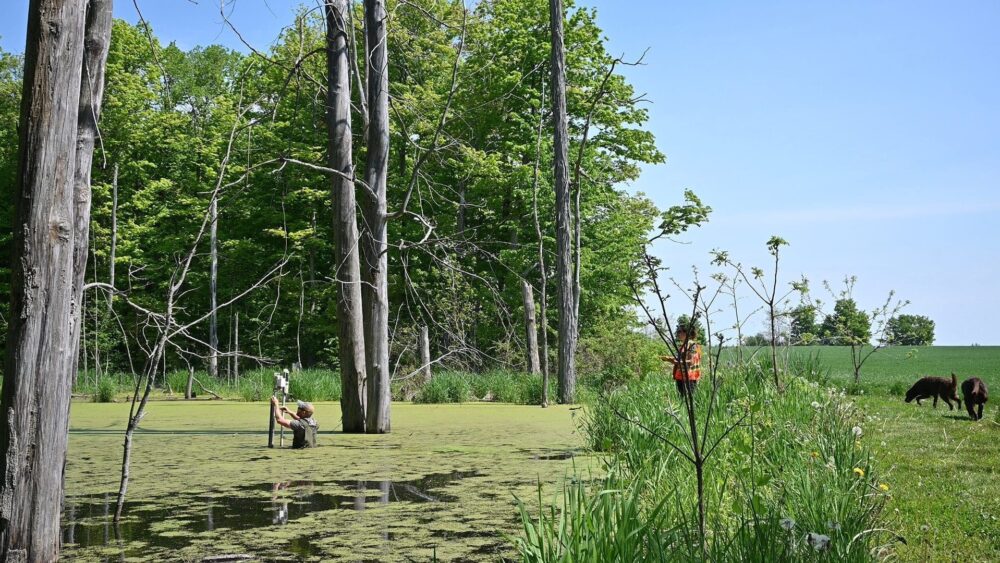- Discover Conservation in Canada
By Province
By Region
By Impact Area
By Program
By Approach
- Get Involved
Attend an Event
Be a Donor
Be a Volunteer
- Be Informed
- About Us
Who we are
What we do
Resources
Can wetlands help heal our sick lakes?

Oak Hammock Marsh, Man. – The Great Lakes region is home to over 30 per cent of Canadians and contains over one-fifth of the world’s fresh water supply. Beyond the provision of drinking water, these lakes provide critical habitat for wildlife and offer recreational opportunities for millions of people.
Unfortunately, the growing presence of blue-green algae blooms are making Canada’s most iconic lakes sick—and people, pets and wildlife along with them. As climate change threatens to accelerate the conditions under which these potentially toxic algae can thrive, new research completed by Ducks Unlimited Canada (DUC) is delivering a message of hope along with nature-based solutions to support clean water in Canada and beyond.
After two years of research conducted in the Lake Erie watershed, DUC’s science is expanding our understanding of how wetlands effectively retain and filter nutrients like phosphorus from water before they travel to our rivers and lakes—reducing the threat of water quality problems like blue-green algae outbreaks. DUC’s research took place at restored wetlands on the north side of Lake Erie—one of North America’s notorious sick lakes—in a region that continues to experience significant wetland habitat loss.
DUC scientists measured the ability of small, restored wetlands to retain nutrients from water before they move downstream. The wetlands were shown to be effective at settling and processing nutrients, especially the most problematic form of phosphorus (soluble reactive phosphorus) known to contribute to the formation of blue-green algae. The research showed significant nutrient reduction in all four seasons. These results bolster findings from past research conducted by DUC, universities and other institutions, offering further evidence that investments in wetland habitat pay off significantly by flowing cleaner, healthier water into our lakes, year after year.
“We’re building the case that restoring the lost functions of wetlands in watersheds can empower communities to help heal their sick lakes,” says Bryan Page, the DUC research biologist overseeing the Lake Erie study led by DUC’s Institute for Wetland and Waterfowl Research. The North American Wetlands Conservation Act of the U.S. Fish and Wildlife Service provided funding for both years of the study. Year two of the study was funded in partnership with the Government of Canada via the Great Lakes Protection Initiative, and year one with the Ontario Ministry of Natural Resources and Forestry and the St. Clair Region Conservation Authority. Support from local participating landowners was integral to the research.
Page’s colleague, DUC research scientist Pascal Badiou, is working closely with the University of Waterloo and Ducks Unlimited science colleagues on the U.S. side of Lake Erie on a research partnership that will build on and scale up this knowledge and its applications for healthy watersheds, even in highly developed areas.
“Decisions being made today on land-use planning policy and wetland management are impacting our future,” says DUC CEO Larry Kaumeyer. “We now know that even small wetlands can deliver ecosystem services like improved water quality, flood attenuation, and carbon sequestration while providing critical habitat for at-risk wildlife species.”
DUC used World Water Day, March 22, to celebrate the completion of the study at a virtual event.
To learn more about DUC’s research and how we’re collaborating directly on the landscape with communities across Canada to restore and create highly functional wetlands that support cleaner water visit ducks.ca/healthy-lakes
Ducks Unlimited Canada (DUC) is the leader in wetland conservation. A registered charity, DUC partners with government, industry, non-profit organizations, Indigenous Peoples and landowners to conserve wetlands that are critical to waterfowl, wildlife and the environment. To learn more about DUC’s innovative environmental solutions and services, visit www.ducks.ca
